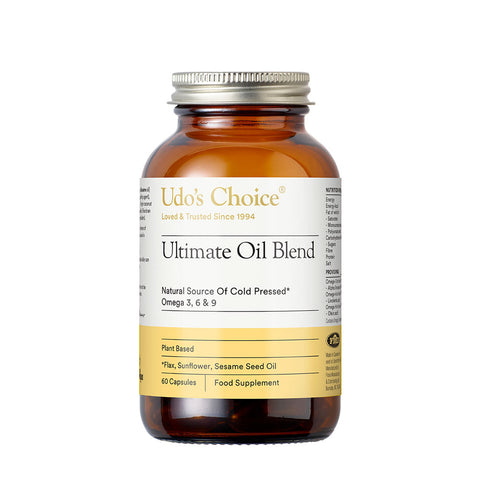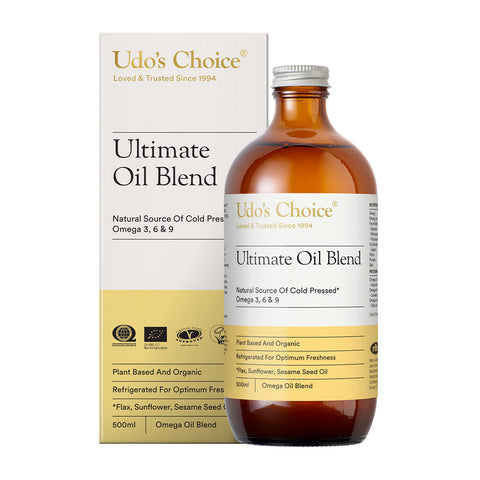In recent years there has been much written about the need to supplement our diets with fish oils. We have been swept along on wave after wave of articles on the benefits of fish oil. However, whilst we have focused on oil supplements we have lost sight of the importance of getting our “foundation” oil intake right.
The food oil foundation
A typical fish oil supplement at recommended doses makes up about 1 to 5 grams of oil daily.
However, our total daily intake of oil is between 75 and 125 grams! If we use 100 grams as our total oil intake per day as an example. A maximum of 5 grams of oil per day will come from fish/algae oil - That’s the Supplement. The other 95 grams of oil per day will come from our foods and cooking oils - That’s the 'Foundation'.

Not all “foundation” oils are healthy and as these form a larger proportion of oils in our daily diet than supplement oils we need to pay more attention to these as a subject for optimum health.
“Foundation” oils can be made up of one or a combination of the following fats
- Damaged Fats (eg.some margarines, some cooking oils and some ready meals)
- Non essential saturated fat (eg.butter, lard, pork, coconut)
- Non essential monounsaturated fat (eg.olive, canola, macadamia, avocado, beans)
- Essential Omega 6 polyunsaturated fat (eg,corn, safflower, grape seed, sunflower, sesame)
- Essential Omega 3 polyunsaturated fat (eg.flax and chia, and small amounts in hemp, walnuts, canola and soybeans)
The fats that form the “foundation” part of our total oil intake affect the way our body operates at the cellular level. For optimum health, the main focus should be on reducing the amount of damaged fats in the foundation and increasing the amount of healthy fats. For optimum cellular performance it is important to obtain the right amount of healthy fats and in the right proportion. The key healthy fats are The Omega 3 Alpha-Linolenic acid (ALA) and Omega 6 Linoleic acid (LA).
Omega 3 ALA and Omega 6 LA are called Essential Fatty Acids as, unlike the other fats, the body cannot produce them itself and yet they are essential to the proper working of the cells that make up our body. (The DHA and EPA Fatty Acids in Fish Oils, although called “Omega 3” are not Essential, though may be beneficial as a supplement). That is why when people have the right amount of Omega 3 ALA and Omega 6 LA and in the right proportion they identify changes in their body such as:
- Improved skin, hair and nails,
- More energy, stamina and recovery,
- Boosted immune system and
- Sharper focus and concentration
Damaged fats
Many of our 'foundation' oils are found in products that have been damaged by processing and contain unnatural and damaged molecules. Cooking oils for instance can be damaged by a variety of processing techniques including heating at high temperatures that damage the beneficial molecules that would have otherwise been of use to our cells. Even fish oil supplements can be damaged during similar processing especially as they are about 25 times more sensitive to damage than cooking oils.
It is important to keep the amount of damaged fats in our diet to a minimum as they show a strong correlation with compromised immune functions and inflammatory conditions such as arthritis, Alzheimer’s, diabetes, osteoporosis, atherosclerosis, auto-immune conditions, allergic conditions and inflammatory skin conditions such as psoriasis and eczema.
Taking an oil supplement without first paying attention to getting our “foundation” right is like eating no food and then swallowing a few vitamins, minerals and amino acid pills. It doesn’t make sense.
Taking a fish/algae oil supplement may be appropriate but not as an alternative to ensuring that our diet is providing us with the healthy, undamaged “foundation” oils that our body needs to function at its best and particularly the Essential Fatty Acids Omega 3 ALA and Omega 6 LA.
So what should we look for in our diet to ensure a healthy oil 'foundation'?
- About 30 to 60 grams should come from oils removed from seeds, nuts and beans. (A good Omega 3 and 6 blend of cold pressed organic seed oils can provide this). Too little will be ineffective in providing a strong foundation. So make sure that if you are taking an Omega Oil already that you are including several tablespoons each day.
- Most of the rest of our 'foundation' oils/fats should come from seeds, nuts, beans themselves plus meat, eggs, dairy products and fish.
- You can also get small amounts of 'foundation' oils from whole grains (but not white flour and white rice) and tiny amounts are also found in vegetables and fruit.
In summary, supplements should be in addition to, not instead of a good 'foundation'.





